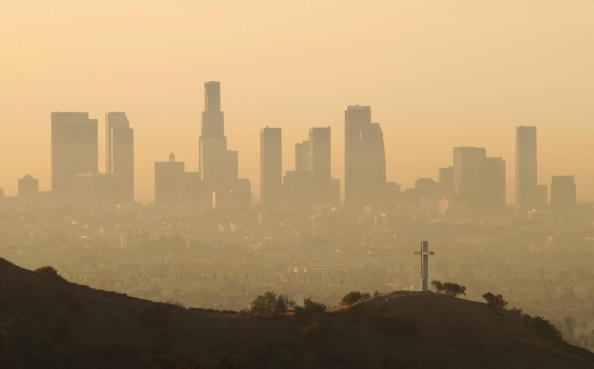Study: Exposure to even 'safe' levels of air pollution could lead to early death


A free daily email with the biggest news stories of the day – and the best features from TheWeek.com
You are now subscribed
Your newsletter sign-up was successful
Harvard University scientists who studied more than 60 million American senior citizens found that long-term exposure to ozone and fine particulate matter, two main air pollutants, is linked to premature death.
Even when the pollutants measured below the limits set by the Environmental Protection Agency, there was still an increased risk of dying early, the scientists said. Fine particulate matter is tiny specks of pollution that can stick to the lungs and is linked to cardiovascular disease, while ozone, found in warm-weather smog, can cause respiratory illness; build-ups of both are caused by emissions from vehicles and power plants.
The researchers developed a new computer model that used air-monitoring data from the ground and satellite measurements to estimate pollution levels in the U.S., the Los Angeles Times reports. They paired that information with health data from Medicare beneficiaries living in the continental United States from 2000 to 2012, and found that it only took being exposed to as little as five micrograms per cubic meter of fine particulate matter, the lowest amount measured, to have an increased risk of premature death. If fine particulate pollution was decreased by one microgram per cubic meter across the United States, it would save about 12,000 lives annually, and if ozone pollution was lowered by one part per billion, an additional 1,900 lives would be saved every year, the researchers determined.
The Week
Escape your echo chamber. Get the facts behind the news, plus analysis from multiple perspectives.

Sign up for The Week's Free Newsletters
From our morning news briefing to a weekly Good News Newsletter, get the best of The Week delivered directly to your inbox.
From our morning news briefing to a weekly Good News Newsletter, get the best of The Week delivered directly to your inbox.
This study will be published in Thursday's New England Journal of Medicine, accompanied by an editorial urging the government to tighten regulation on fine particulate matter and ozone. Read more about the new study — and how EPA Administrator Scott Pruitt is delaying implementing the federal ozone standard because of "increased costs to businesses" — at the Los Angeles Times.
A free daily email with the biggest news stories of the day – and the best features from TheWeek.com
Catherine Garcia has worked as a senior writer at The Week since 2014. Her writing and reporting have appeared in Entertainment Weekly, The New York Times, Wirecutter, NBC News and "The Book of Jezebel," among others. She's a graduate of the University of Redlands and the Columbia University Graduate School of Journalism.
-
 How the FCC’s ‘equal time’ rule works
How the FCC’s ‘equal time’ rule worksIn the Spotlight The law is at the heart of the Colbert-CBS conflict
-
 What is the endgame in the DHS shutdown?
What is the endgame in the DHS shutdown?Today’s Big Question Democrats want to rein in ICE’s immigration crackdown
-
 ‘Poor time management isn’t just an inconvenience’
‘Poor time management isn’t just an inconvenience’Instant Opinion Opinion, comment and editorials of the day
-
 Nobody seems surprised Wagner's Prigozhin died under suspicious circumstances
Nobody seems surprised Wagner's Prigozhin died under suspicious circumstancesSpeed Read
-
 Western mountain climbers allegedly left Pakistani porter to die on K2
Western mountain climbers allegedly left Pakistani porter to die on K2Speed Read
-
 'Circular saw blades' divide controversial Rio Grande buoys installed by Texas governor
'Circular saw blades' divide controversial Rio Grande buoys installed by Texas governorSpeed Read
-
 Los Angeles city workers stage 1-day walkout over labor conditions
Los Angeles city workers stage 1-day walkout over labor conditionsSpeed Read
-
 Mega Millions jackpot climbs to an estimated $1.55 billion
Mega Millions jackpot climbs to an estimated $1.55 billionSpeed Read
-
 Bangladesh dealing with worst dengue fever outbreak on record
Bangladesh dealing with worst dengue fever outbreak on recordSpeed Read
-
 Glacial outburst flooding in Juneau destroys homes
Glacial outburst flooding in Juneau destroys homesSpeed Read
-
 Scotland seeking 'monster hunters' to search for fabled Loch Ness creature
Scotland seeking 'monster hunters' to search for fabled Loch Ness creatureSpeed Read
